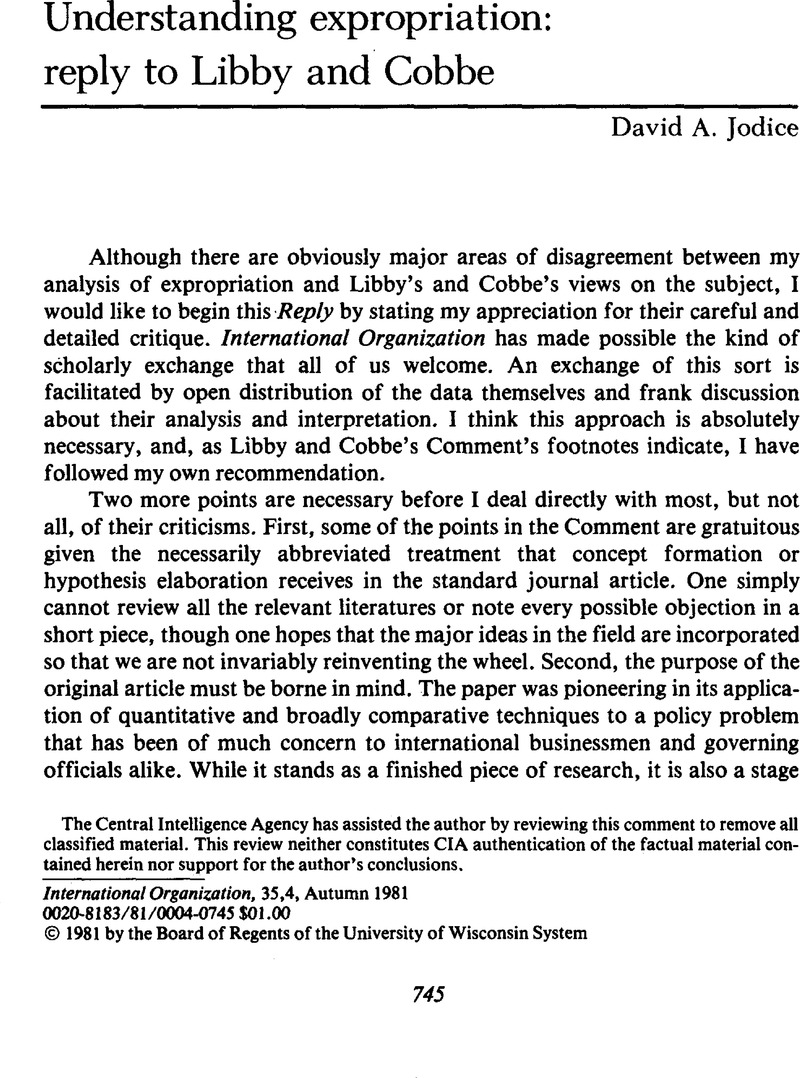No CrossRef data available.
Published online by Cambridge University Press: 22 May 2009

The Central Intelligence Agency has assisted the author by reviewing this comment to remove all classified material. This review neither constitutes CIA authentication of the factual material contained herein nor support for the author's conclusions.
1 The original article in this journal reported some of the research from Jodice, , “The Politics of Expropriation: Sources of Change in Third World Foreign Investment Regimes, 1968–1976,” Ph.D. diss., Harvard University, 1980Google Scholar.
2 See Kobrin, Stephen J., “Political Risk: A Review and Reconsideration”, Journal of International Business Studies (Spring/Summer 1979): 67–80Google Scholar.
3 Truitt, J. Frederick, Expropriation of Private Foreign Investment (Bloomington: University of Indiana Press, 1974)Google Scholar; Williams, M. L., “Extent and Significance of Nationalization of Foreign-Owned Assets in Developing Countries, 1956–1972”, Oxford Economic Papers 27 (08 1975): 260–73Google Scholar; Knudsen, Harald, “Explaining the National Propensity to Expropriate: An Ecological Approach”, Journal of International Business Studies 5 (Spring 1974): 51–72CrossRefGoogle Scholar; Hawkins, Robert G. et al. , “Governmental Takeovers of U.S. Foreign Affiliates”, Journal of International Business Studies 7 (Spring 1976): 3–16CrossRefGoogle Scholar.
4 Kobrin, Stephen J., “Recent Trends in the Forced Divestment of Foreign Enterprises”, paper presented at the annual meeting of the International Studies Association, Philadelphia, 18–2103 1981Google Scholar.
5 Moran, Theodore H., Multinational Corporations and the Politics of Dependence (Princeton, N.J.: Princeton University Press, 1974)Google Scholar.
7 Jodice, , “Governing Regime Characteristics and Foreign Investment Risk”, paper presented at the annual meeting of the International Studies Association, Philadelphia, 18–2103 1981Google Scholar.
7 Jodice, , “The Political-Economy of Self-Reliance: A Quantitative Study of the Effects of Nationalism on Economic Growth”, paper presented at the annual meeting of the International Studies Association, Los Angeles, 19–2203 1980Google Scholar.
8 Sigmund, Paul, Multinationals in Latin America:The Politics of Nationalization (Madison: University of Wisconsin Press, 1980): 47–83Google Scholar.
9 OECD, Stock of Private Direct Investments by Development Assistance Committee Countries in Developing Countries, End 1967 (Paris: OECD, 1972)Google Scholar.
10 U. S. Department of Commerce, U. S. Direct Investment Abroad, 1966. Part I, Balance of Payments Data; Part II, Investment Position, Financial and Operating Data (Washington, D. C.: U. S. Government Printing Office, 1971)Google Scholar.
11 Sigmund, , Multinationals in Latin America, pp. 131–78Google Scholar.
12 For an excellent study of this problem, see Jackman, Robert W. and Boyd, William A., “Multiple Sources in the Collection of Data on Political Conflict”, American Journal of Political Science 23 (05 1979): 434–58CrossRefGoogle Scholar.
13 Hibbs, Douglas A., Mass Political Conflict (New York: Wiley, 1973)Google Scholar; and Zimmerman, Ekkart, “Political Protest,”; in Gurr, Ted Robert, ed., Handbook of Political Conflict (New York: Free Press, 1980)Google Scholar.
14 For a discussion of alternative indicators see Mahler, Vincent A., Dependency Approaches to International Political Economy (New York: Columbia University Press, 1980)Google Scholar; and Taylor, Charles Lewis, ed., Indicator Systems for Political, Economic and Social Analysis (Cambridge, Mass.: Oelgeschlager, Gunn and Hain, 1980)Google Scholar.
15 Jodice, “Politics of Expropriation,” chaps. 3–5.
16 A recent example of the time-series approach is Jones, Randall, “An Economic Model of Expropriation in Venezuela,” paper presented at the annual meeting of the International Studies Association, Philadelphia, 18–2103 1980Google Scholar.
17 As the Comment indicates and a review of the senior author's published research suggests, he and I see the world in very different terms. See Libby, Ronald T., “External Co-optation of a Less Developed Country's Policy Making: The Case of Ghana, 1969–1972”, World Politics 29 (10 1976): 67–89CrossRefGoogle Scholar; “International Development Association: Legal Fiction Designed to Secure an LDC Constituency”, International Organization 29 (Winter 1975): 105–72Google Scholar; and “The Ideology and Power of the WorldBank,” Ph. D. diss., University of Washington, 1975Google Scholar.